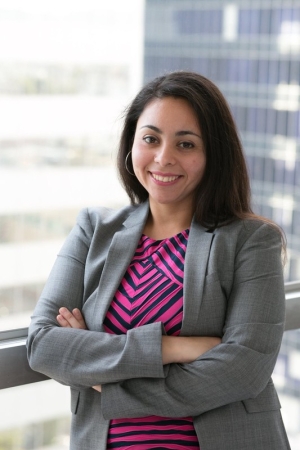Double Vision: Student Aims to Reform Health Care with Dual Degree
February 26, 2016 / by Miranda Mazariegos- Research
Before Lisa Higuera became a student at the USC School of Social Work, she worked at pro-bono law firm Public Counsel helping underserved families access an education for their children. A daughter of immigrants, Higuera wanted to help families like hers reach their children’s educational goals by eliminating social barriers.
However, it didn’t take long for her to realize there was a bigger problem that needed to be addressed.
Many of her clients canceled their appointments due to health-related concerns, and she realized that to advocate for educational access, people first needed to have access to proper health care. This realization made her shift her goals from the education sector to health administration.
“People have a right to advocate based on education. But if they do not have access to health care, then they might be unhealthy, and if they’re unhealthy, they’re not able to advocate [effectively],” she said. “Before families can make themselves available to fight for students and to fight for their children, they have to make sure that their families are healthy.”
Now pursuing a dual master’s degree in social work and public administration from USC, Higuera wants to tie together her knowledge in both fields to help families like her own understand health issues and make access to health care available for those who need it most.
Underserved and underrepresented
Growing up in a Spanish-speaking household, Higuera didn’t start learning English until she was 7 years old. While attending schools in both South and East Los Angeles, she witnessed pervading biases in the education system.
One of her good friends had to drop out of the seventh grade due to lack of support from school administration following an unplanned pregnancy. Another one of her classmates dropped out after the school failed to provide support following an emotional domestic trauma, which resulted in him having to move in with relatives.
“As far as I knew, neither of my classmates’ issues was addressed by our teachers, and we never saw them again,” Higuera wrote in an article for EdSource.
Her experience growing up in this marginalized population shaped her understanding of social injustice. Higuera saw that there are a lot of people who don’t have access to education and health care, and from an early age she was inspired to change that.
“I fell in love with social work because it really talks about the value of the person, the integrity that we have and how we can promote social justice in our work,” she said. “There is a way to address that professionally, and that is beautiful – it’s very empowering.”
Helping families
After graduating from the University of California, Berkeley, with a degree in Chicano studies, film studies and ethnic studies, Higuera went on to work at Public Counsel, where she was part of a team that addressed disparities in education for underserved students in Los Angeles. In targeting specifically South and East LA, Higuera was passionate about helping a population so close to home.
Given her bilingual abilities, she helped Spanish speakers understand and access the many services that Public Counsel offered. From filing cases with the court system to assisting in translating process hearings, her role was key in connecting underrepresented families to the help they needed.
“A lot of time parents were monolingual Spanish speakers, who because of that were unable to access the public education that their children should have under law. And so we helped them close that gap,” she said.
It was at this job that she started to see that many problems stemmed from a lack of health care. Although Higuera feels passionate about the education system, health care hits very close to home for her. Losing not only her father but also two other family members to cancer, Higuera wants to help families like her own before it’s too late. After five years at Public Counsel, she finally decided to go back to school and pursue master’s degrees at USC.
Blending her passions
Higuera chose USC largely because of the inspiring alumni and USC faculty she met while working in the Children’s Rights project at Public Counsel.
Katie Brown, adjunct lecturer in the Virtual Academic Center at the School of Social Work, was one of those professors who worked with Higuera at Public Counsel.
“[Lisa] single-handedly kept us organized. There really should’ve been three people doing her job. We really need to credit her for our ability to stay current and staying aware with what was happening around the country and what was happening with our clients,” Brown said.
Higuera recently performed a field placement at the Los Angeles Center for Law and Justice, where she worked in similar fashion to the job she had at Public Counsel. As a social worker on staff, she worked as a community care advocate and served the non-legal needs of her clients.
“The best part of my job was being able to connect with people on a one-on-one basis, knowing that is part of a greater movement to serve people in public interest agencies in Los Angeles,” she said.
For her public administration master’s degree program, Higuera is working at Beverly Hospital in Montebello, California, as a community benefits intern. She is creating partnerships with community agencies and companies to help the hospital meet Affordable Care Act reporting requirements, giving her valuable experience she’ll need in assisting families.
“My vision is that in the long term, I am a health administrator…bringing in the knowledge and expertise of social work intervention, and then tying that into community organizing,” she said. “That way, people can use community building to transform themselves and to heal each other.”
To reference the work of our faculty online, we ask that you directly quote their work where possible and attribute it to "FACULTY NAME, a professor in the USC Suzanne Dworak-Peck School of Social Work” (LINK: https://dworakpeck.usc.edu)
